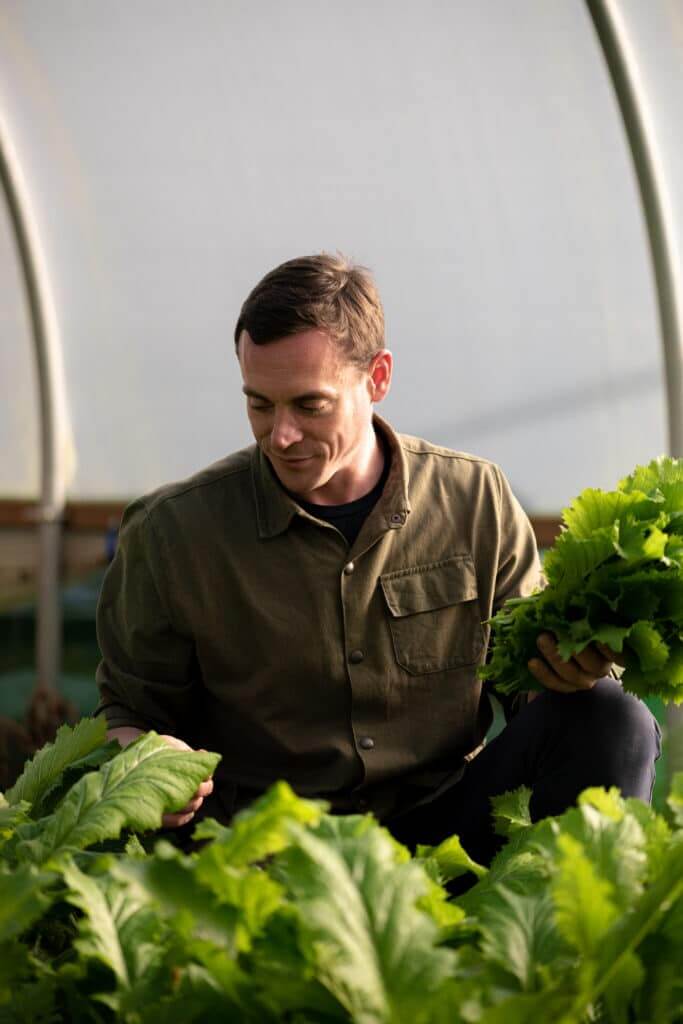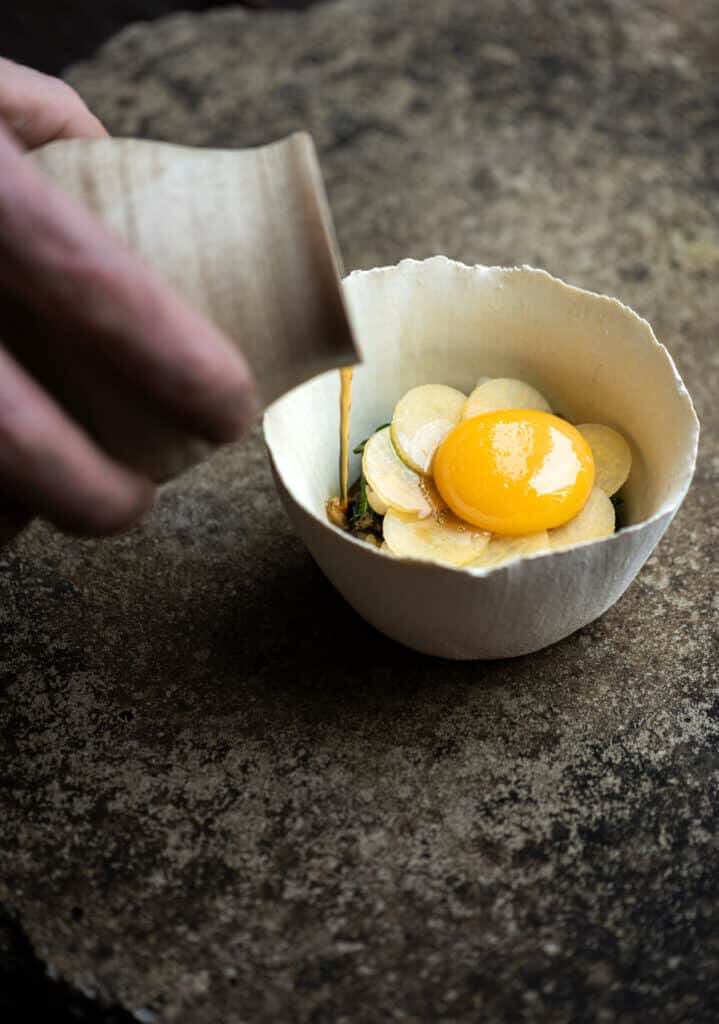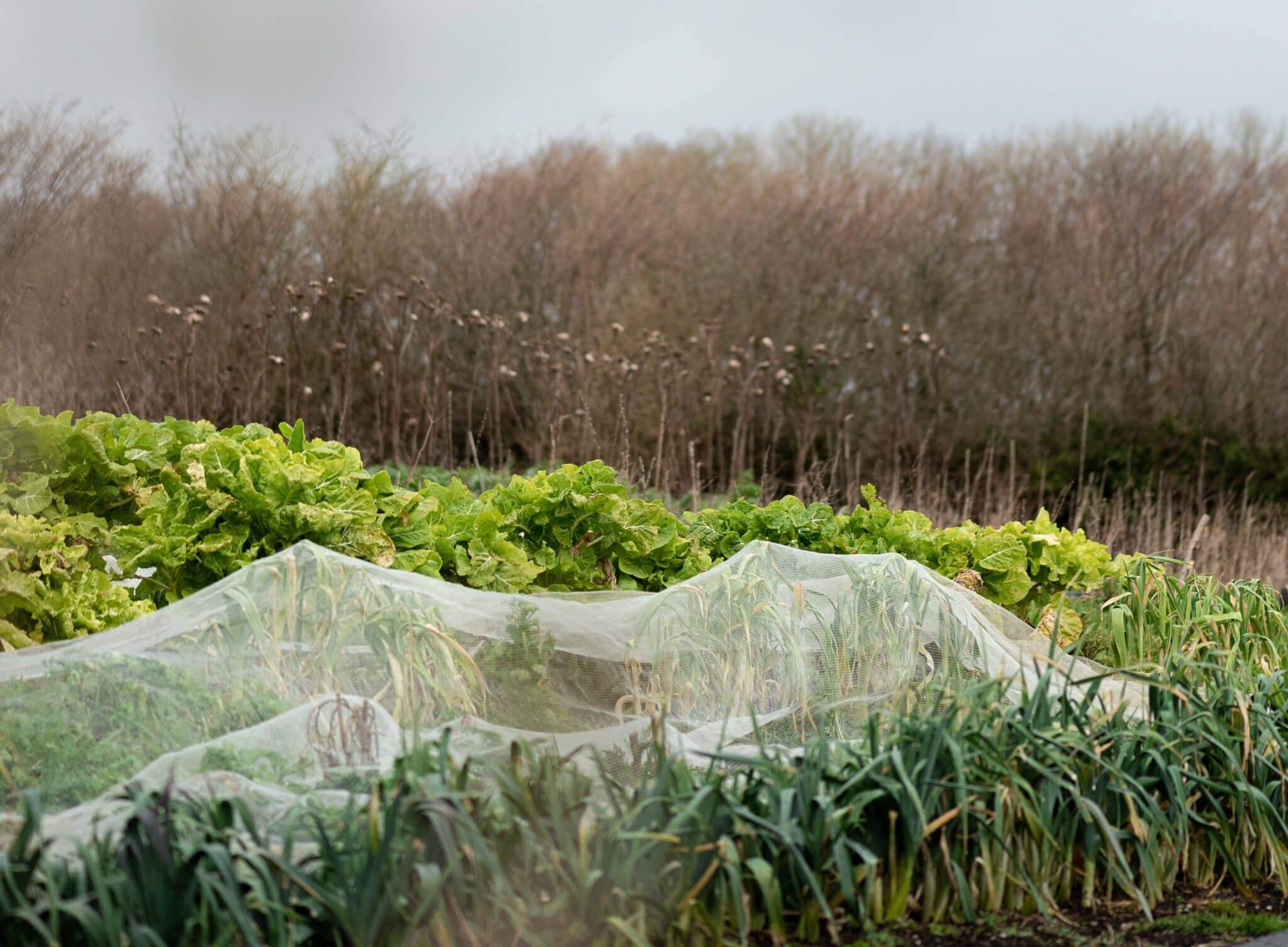“The main thing was, I wanted to build a farm, not a restaurant,” explains Dan Cox, chef, farmer and restaurant owner. We’re standing in what’s soon to be converted into a bakery, here at Crocadon Farm in St Mellion, Cornwall.
It’s taken five years of regeneration to get the 120-acre farm (which is partially certified organic) to this stage, which is now supplying the newly opened restaurant of the same name.
His farm-led restaurant is the latest opening in a similar wave in Cornwall and the South West. These self-reliant restaurants are using small holdings, kitchen gardens or large farms to provide much of the produce and meat for their restaurants, such as Coombeshead Farm near Launceston, Nancarrow Farm near Truro, and the Field Kitchen at Riverford’s Wash Farm. But it’s Cox’s “farm first” attitude that sets him apart from his more restaurant-focused contemporaries.
The menu was devised just days before opening, when Cox and his head chef walked around the garden to see what produce was ready. The menu takes the form of an evening tasting menu or a three-course Sunday lunch. The latter is a modern take on the traditional roast, designed to share and with the produce and its farm-to-table journey as the star of the show. Veg dishes include a delicately cooked Queensland Blue squash, dusted with a crumble mix of squash seeds and dried Dragon’s Tongue chilli, and a bowl of brassicas livened up with lashings of koji butter sauce.
Cox, who hails from north London, admits he “didn’t know anything about pasture before I came here”. Although he wasn’t totally new to every aspect of it. It was the seven years working at Simon Rogan’s now three-Michelin star restaurant, L’Enclume, some 400 miles north in the Lake District, which fuelled some of the inspiration behind Crocadon, where he helped create its own veg growing operation to supply the restaurant.

Crocadon’s ethos, says Cox, is about using the connection between the restaurant and farm to help “bridge the gap around the lack of transparency of produce”, which he thinks is majorly lacking.
He researched the work of organic farmer Jean-Martin Fortier in Quebec and Korean Natural Farming, which relies on recycling waste, among others, and quickly realised that “it was all about the soil”. And then he began working to regenerate it. This was not only to produce better, healthier crops and animals, but to increase the levels of micro and macro nutrients in them, as “nutrition directly leads to better taste and flavour”, explains Cox.
Cox chooses to describe Crocadon as a “soil-centric farm”, instead of using the terms organic or ‘regenerative‘, as it “immediately indicates that everything starts and finishes with the health of our soils”.
All of the produce and dry goods for the restaurant are organic certified, except for a few smaller, local fruit growers that don’t have certification but follow organic practices, says Cox.
“Both terms ‘organic’ and ‘regenerative’ are important. Although ‘regenerative’, is a little bit less relevant because there’s people using glyphosate and calling themselves regenerative,” he adds. It’s glyphosate which is the real bone of contention, as it’s banned in organic farming, but can be used in regenerative agriculture, despite being a harmful chemical, making it feel very counterintuitive.
That doesn’t mean Cox doesn’t still see the word “regenerative” as encapsulating what many so-called ‘regen farmers’ are trying to do. “Regenerative should be the word that you use, because we’re talking about regenerating at all times,” he says. And it’s the regeneration of the soil that’s been the most rewarding part of his farming project so far.
Glyphosate is not the only issue Cox has run into when it comes to regenerative agriculture either.
He totally agrees that “no dig and no till is the way forward”, but he adds, “there are exceptions”. As Crocadon is a clay farm, he thinks “it’s a shame that people have picked up on no tillage as the main thing that makes you regenerative”. For him, this fails to take into account different types of soil and their needs. “Without some form of tillage here, every now and again, including ploughing, the soil just gets tighter and tighter and tighter. So, trying to direct drill into tight soil gives you no crop whatsoever,” he says.

Aside from the soil and produce, the farm has a circular approach to sourcing other products. The restaurant serves cider from local business Ripe Cider, and stocks organic and biodynamic wines, but Cox says he’s struggled to source organic beer. “In the brewing world, if it doesn’t say organic on it, then all that grain has been desiccated with glyphosate,” he explains.
As a home-brewer enthusiast, the first thing Cox did was to set up his own mini organic microbrewery on the farm. Now James and Nia Rylance have taken over and run Ideal Family Brewery in the space and use grains, herbs and plants from the farm, which Cox will be serving in the restaurant in just weeks.
The current last piece to the Crocadon puzzle is the pottery, which also supplies the restaurant. A self-taught potter, Cox compares the art of pottery to cooking and baking, highlighting the similarities between rolling out pastry and clay and then baking it.
Crocadon has only been open a matter of days, but Cox already has more plans. Being in rather remote south-east Cornwall, close to the Devon border, he’d love to provide accommodation too, and there’s soon to be a farm shop.
The proof, as they say, is in the pudding, but here it’s in everything Cox has created and his plans for what’s next.










Fantastic project, hope to be lucky enough to visit one day. I am confused as to the need to till the soil in certain circumstances, as I thought the root systems and the return of the micro life they bring would open up and allow life to return in even the heaviest clay soils with no need to till?
I’d put it stronger than that, this bloke does not know what he is talking about. “Tight” , what is that? I assume it means compaction. Well fluffing the soil up like something in the kitchen will just move the compaction down to the depth of the plough and the apparently loosened soil will just slump down again. Compaction is not a sign of lack of air spaces but a lack of biological life!
One pass of the plough will negate several years of building the biology. And it is not just a case of no till. Have a look at the videos from last year’s Groundswell of Gabe Brown and colleagues, do the spade test and compare your soil with the examples he shows. The ultimate is to incorporate grazing animals in the rotation